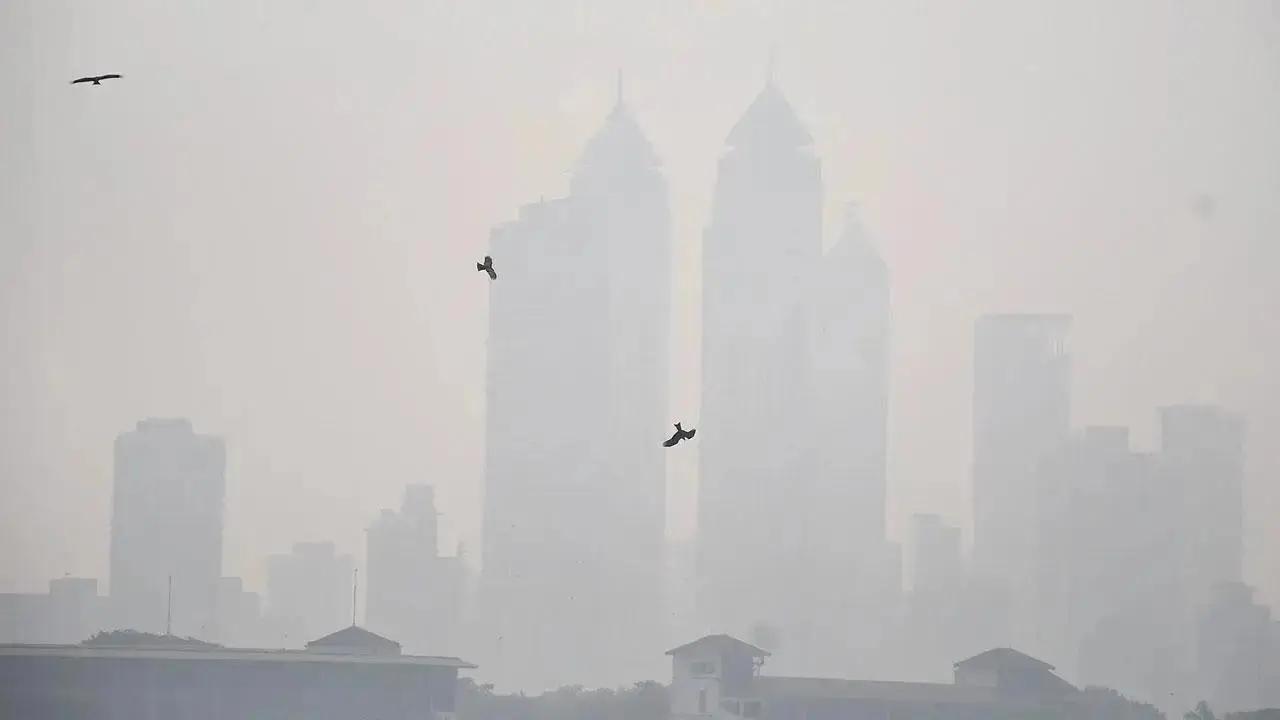Mumbai's air quality has deteriorated, with a health alert being issued in the CST (Chhatrapati Shivaji Terminus) area. On Wednesday, the overall Air Quality Index (AQI) for Mumbai was measured at 149, categorizing it as 'Moderate' according to data provided by the System of Air Quality and Weather Forecasting and Research (SAFAR)-India

File Photo/Nimesh Dave
Key Highlights
- Many areas in the city experienced `poor` and `very poor` air quality
- The air quality in the Bandra Kurla complex was categorized as `poor`
- Air quality and pollution levels in metropolitan cities continue to be matter of concern
Mumbai's air quality has deteriorated, with a health alert being issued in the CST (Chhatrapati Shivaji Terminus) area. On Wednesday, the overall Air Quality Index (AQI) for Mumbai was measured at 149, categorizing it as 'Moderate' according to data provided by the System of Air Quality and Weather Forecasting and Research (SAFAR)-India. However, many areas in the city experienced 'poor' and 'very poor' air quality, news agency ANI reported.
ADVERTISEMENT
At 7 am, the state pollution control meter at Chhatrapati Shivaji Terminus (CST) recorded 'very poor' air quality, prompting a health alert for the CST area. The air quality index varied across different areas of Mumbai, with the Bandra Kurla Complex showing a 'moderate' air quality with an AQI of 200 at 9 am, while Colaba and Borivali East reported 'moderate' air quality with AQIs of 151 and 141, respectively.
On Tuesday, the air quality in the Bandra Kurla complex was categorized as 'poor,' despite the city's average AQI being 145 (moderate), as per SAFAR data.
In response to the worsening air pollution, the Bombay High Court passed interim directions on Monday, permitting the bursting of firecrackers only for a limited period of 3 hours, between 7 pm and 10 pm.
Air quality and pollution levels in metropolitan cities, including Mumbai and Delhi, continue to be a matter of concern. In Delhi, the air quality index remained in the 'severe' category on Wednesday morning, with Anand Vihar recording an AQI of 452, and other areas such as RK Puram, Punjabi Bagh, Sri Aurobindo Marg, and Shadipur also reporting 'severe' air quality.
Residents and commuters in Delhi have reported breathing problems and have urged the government and relevant authorities to take immediate steps to address the escalating air pollution crisis. A thick toxic haze or 'smog' persisted over the national capital, with the Central Pollution Control Board (CPCB) confirming that the air quality remained in the 'severe' category on Wednesday.
Also read: Now, anti-pollution norms for all infrastructure projects in Mumbai
Meanwhile, the Delhi government on Wednesday said the odd-even car rationing scheme will be implemented in the national capital after the Supreme Court reviews its effectiveness and issues an order.
Addressing a press conference, Environment Minister Gopal Rai said the city government would submit the results of two major studies conducted by the Energy Policy Institute of the University of Chicago and the Delhi Technical University to determine the scheme's effectiveness for the Supreme Court's review. "The decision to implement the odd-even scheme will be made only after the Supreme Court reviews its effectiveness and issues an order," the minister said, adding that the matter will be next heard on Friday.
On Tuesday, the apex court questioned the effectiveness of the Delhi government's scheme, aimed at curbing vehicular pollution, and referred to it as "all optics." (With inputs from agencies)
 Subscribe today by clicking the link and stay updated with the latest news!" Click here!
Subscribe today by clicking the link and stay updated with the latest news!" Click here!







